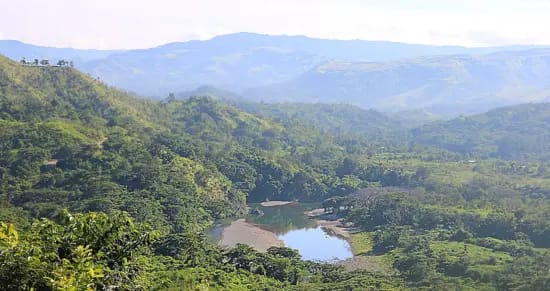BY VASILEIA FANARIOTISENIOR ONLINE CORRESPONDENT
Photos courtesy of Bula Coffee
Nestled in 4.5 acres of beachfront and riverside land near Sigatoka town in Fiji, Bula Coffee is a vertically integrated bean-to-cup coffee company.
Bula was founded in 2011 by Luke Fryett, who discovered wild coffee cherries during his horseback rides through the highlands of Fiji. This led to Bula Coffee’s mission: partnering with remote villages to harvest, process and market wild coffee while providing farmers with a sustainable livelihood.
From Wild Harvest to Café Culture
The Fijian archipelago consists of 333 islands, located in the South Pacific, north of New Zealand. With a rich volcanic soil boasting plenty of minerals, it was only fitting that wild coffee grows there. Coffee grows wild on the islands of Viti Levu and Vanua Levu, and is mainly harvested by hand. Bula Coffee works with 25 villages in Fiji to harvest the wild-growing coffee and then process it.
Unlike other parts of the world where coffee and tea drinking are popular, in Fiji the traditional drink of choice is a concoction called grog. Grog is made from pounding sun-dried kava root, which is then strained and mixed with cold water. It’s typically served from a shorn half-shell of a coconut, called a bilo, and is especially popular during social gatherings.
However, Luke tells me that coffee drinking is becoming increasingly popular in Fiji. “In the last 10 years the coffee industry has exploded in Fiji, in the sense that cafés are popping up everywhere. Before then coffee was just instant in a cup with hot water. Now coffee culture is the norm—going to a café with friends, getting your flat white or a long black before work.”
Overcoming Challenges to Sell Local Coffee
Bula Coffee faced some resistance when they started their business in the remote Pacific Islands. The government claimed that coffee does not grow in Fiji, and would only help with growing potatoes. This is starting to change, however, as the new government now has initiatives around growing coffee. Unfortunately, many people have a negative perception of locally made goods in Fiji and the Pacific at large. They believe that imported goods from New Zealand or Australia are of higher quality.
“We constantly faced this challenge with resorts, who would say, ’Oh no, we use a top-quality imported coffee,’ or, ’We import ours as it’s what high-end guests want.’” Luke says. During COVID, this changed because people started buying local. The new government also put out a big “Buy Fiji-made“ campaign, which has helped.
As coffee production in Fiji continues to grow and evolve, visitors to Bula Coffee can now experience the process. They recently launched the Cherry to Cup Coffee Tour, which takes guests on a 1.5-hour journey through the numerous steps involved in transforming a coffee cherry into their morning brew. From harvesting and drying the cherries to roasting and tasting the final product, visitors can gain a deeper understanding of the steps involved in making a cup of coffee.
Impacting Lives Through Bula Coffee’s Mission
On the agricultural side, the Fijian coffee industry is gaining momentum, with wild harvesters transitioning to full-time coffee growers with family-owned farms. The Australian Centre for International Agricultural Research (ACIAR) has been working with Bula Coffee to ensure farmers are given varieties that best suit their location. Thousands of wild harvesters receive income through Bula Coffee’s buying. Assistance is also given in the form of establishing farms to increase yield.
“We always say we know our farmers by name, and we shake the hand that picks the coffee,“ Luke says. “In times of natural disasters, we have actively provided shelter to our farmers, offering them a safe haven. Once the disaster has passed, we swiftly enter the affected villages to assess the situation and promptly deliver emergency aid. We then continue our efforts by assisting them in their recovery and reconstruction process.“
Bula has also helped to empower the local women, who express themselves with confidence during meetings. They also prevented an ecological tragedy. “There were developers who sought to demolish one of our villages for a project, including the precious wild coffee,“ Luke explains. “However, the women united and successfully halted this destruction. They recognized the significance of this coffee not just as their source of income, but also as a valuable resource that they needed to safeguard.“
Looking Ahead
Bula Coffee has come a long way in their mission to support remote villages in Fiji through the harvesting, processing, and marketing of wild coffee. Through tours and initiatives, they are helping to create a greater appreciation for locally grown coffee. This in turn provides families with an opportunity to make an income.
We are excited to see the future of Bula Coffee’s journey in the South Pacific and how it will continue to impact the lives of coffee growers in Fiji.
ABOUT THE AUTHOR
Vasileia Fanarioti (she/her) is a senior online correspondent for Barista Magazine and a freelance copywriter and editor with a primary focus on the coffee niche. She has also been a volunteer copywriter for the I’M NOT A BARISTA NPO, providing content to help educate people about baristas and their work. You can follow her adventures at thewanderingbean.net.
READ THE LATEST BARISTA MAGAZINE
Out now: It’s the August + September 2023 issue of Barista Magazine, featuring Boram Um of Brazil on the cover. Read it for free with our digital edition. Get your Barista Magazine delivered; start a subscription today! Visit our online store to renew your subscription or order back issues.


